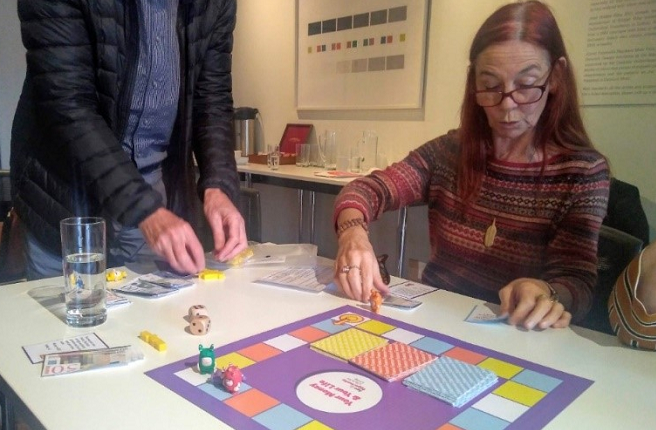Transitions in Later Life learning community: November 2018

Looking to the future
November 2018 was the last learning community meeting that was coordinated by the Calouste Gulbenkian Foundation (UK Branch) and the Centre for Ageing Better (CfAB). However, this is not the end of the learning community. The group expressed their desire to coordinate meet ups in 2019.
The TiLL programme is now approaching its legacy stage, and we are thinking about consolidating and embedding the work. To this end, the Foundation and CfAB have together hired a new Partnerships & Influencing Manager, Emma Foxall, whom the group met and briefed.
Delivery of all projects under this grant programme will conclude this year. The organisations in the group are continuing to think about their direction and next steps, developing and embedding new partnerships, scaling up, and creating resources such as training manuals. They began the session by looking to the future, and identifying challenges and opportunities in their work.
English Longitudinal Study of Ageing (ELSA) research – CfAB
CfAB is working on interpreting the findings from ELSA Wave 8, including questions concerning the health and lifestyles of people aged 50+. We know that ageism can have serious health consequences, including lowered levels of self-efficacy, physical function and memory loss.
Aideen from CfAB presented data from Wave 8 of the ELSA, which indicates that people who hold pessimistic views about later life are more likely to have a more negative experience of growing older. Worry and negativity can have adverse effects on health and wellbeing, which can result in a negative feedback loop in which poor outcomes accumulate. The group discussed these findings and the role of the TILL courses in reducing feelings of pessimism.
Discourse workshop: from ‘older people’ to ‘life course’ – Centre for Policy on Ageing
Dave and Hannah invited us to consider the difference between transition as it occurs in discourse around ‘older people’ and transition as it occurs in discourse around the ‘life course’. In two groups, we concentrated on two discussions.
The first centred on the differences between a life course approach and a older-person centred approach. The group agreed that there are many similarities between the two, however the life course approach focuses on the wider system, instead of the individual. The life course perspective creates a balance between personal responsibilities and societal responsibility. Whereas, the life course approach is more about expressing agency and being involved in the process, the older-person centred approaches are more about deciding something for an individual.
The second discussion was about taking a life course approach in health and wellbeing services. This would view all points on the circle of life as equally important and valuable. The group used the example of education to reflect on how a life course approach could shift attitudes. Currently, education is ‘frontloaded’ to focus on children and young adults, whereas a life course approach would emphasise the importance of education at any age.
Legacy session – CfAB
Next, Jemma led the group through a session on legacy, providing an opportunity to consider next steps for each organisation and as a community.
Three key themes emerged. The first was the ambition to scale up, help more people to access resources (courses and tools), and reach a wider age-range. The second theme was to translate the work into other agendas, such as ageing or loneliness, or use a human rights framing. The final aim was to change discourse to a ‘life course’ approach. This aim intersects with the desire to promote ‘pro-ageing’ or positive ageing.
AgeWise film
Margot began day two with a short film that introduces the AgeWise programme, and a group meditation.
Loneliness and transitions discussion – Beth Johnson Foundation
The group discussed an understanding of the life as a cycle (referencing life course, fluidity, a river of life). This contrasts with the dominant discourse of a ‘timeline’ which focuses on an end point.
Next, the group turned their attention to the topic of loneliness. Transitions such as retirement, attending university or leaving a job, can lead to loneliness. While loneliness is not age-specific, older age can sometimes contribute due to withdrawal and/or separation. The group agreed that activities related to TILL can help to cope with loneliness; providing perspective, reflection and support.
‘Your money and your life’ – Age & Opportunity
The group played and fed back on Age & Opportunity’s board game, “Your Money and Your Life”. The game seeks to convey the need to prioritise what is important in life, and the balance between practical and emotional/social needs.

Thank you all so much for your help and contributions to the learning community over the last three years. It’s been a pleasure to work with you all!
